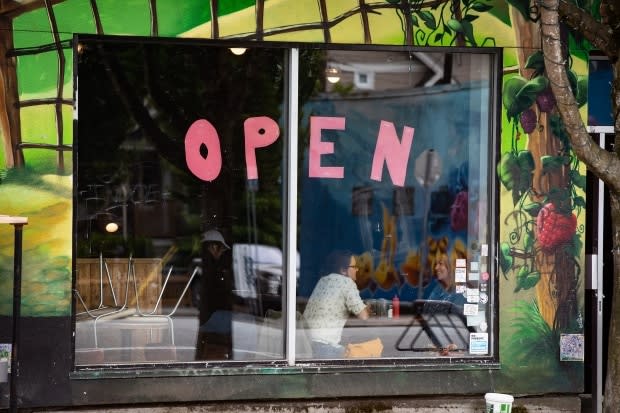Lawyer Cletus Flaherty discusses workplace rights, obligations and legislation for COVID-19

Some workers who enter Newfoundland and Labrador are exempt from self-isolating, leaving other employees worried about potentially contracting COVID-19.
On Wednesday it was reported that four people are coming from Texas to work on a ship owned by Maersk in St. John's next month. They are exempt from self-isolation upon arrival.
CBC Radio's St. John's Morning Show asked Cletus Flaherty, a lawyer who specializes in labour and employment, about employer obligations, legislation and options employees have if they feel their job puts them at risk for COVID-19.
Following is that conversation.
The discussion has been edited for length and clarity.
Q: What do you make of the situation aboard the Maersk Nexus? Do you think the crew members are right to be worried?
Cletus Flaherty: In this time, everyone is worried about how COVID-19 is transmitted, how they might be infected and how they might infect family members. I completely understand the stress and anxiety that must be going through these Maersk workers, even though as we do understand, Maersk has a protection plan in place.
What options do employees have if employees feel their job puts them at risk for COVID-19?
I wish I had good news for people and I wish I could comfort workers but it's not an easy situation. It's actually a quite difficult one. With respect to workers who might want to refuse unsafe work because the workplace is not safe or the employer has not put in a protection plan which adequately prevents the transmission of COVID-19, these workers still have to report to work. So that's the first big issue. Since April, I'd say I've had approximately 30 different workers call me wondering how COVID-19 impacts their workplace rights and obligations, and unfortunately for these workers worried about going back to work, there's not really a lot of options for them to say that they're not going to report.
The impetus is on the workers to report to work and at that that point they need to make an assessment. And it's a very difficult one, because in practice, I find refusals to engage in unsafe work are very rarely made out. So the workers in the province and in particular workers on marine vessels are definitely in a very difficult spot. I don't envy them and I don't envy the employers who have the responsibility to protect these people.
What obligations do employers have to ensure they are protecting employees?
The novel situation of COVID-19 poses challenges for everyone. The regulatory system, the occupational health and safety system that's in place, I mean that hasn't contemplated a global pandemic. It hasn't developed with those challenges in mind.
So I mean generally, the employer needs to provide a safe workplace. In general terms at this point, and this is my opinion because we don't have any case law in the province right now at this point, but at a minimum employers should provide the necessary [personal protective equipment] for their employees as well as have a plan that allows for the execution of work duties in a manner that allows for social distancing.
Now, when you speak of workers on marine vessels, I would suggest that duty goes even a step further in that their protection plans should provide for a proper quarantine plan if there is an outbreak on the vessel.
These exemption orders that we have in place here in Newfoundland and Labrador, they do provide that workers who are exempt from the normal 14-day isolation period still must isolate when they're not at work or travelling to and from work.That provides some difficulties when you're on a marine vessel out at sea. How are you going to adequately self-isolate in that situation, where you're essentially on a floating workplace and you don't get to go home? And in that regard, I mean, the protections that these exemption orders are trying to afford to workers and the population of Newfoundland and Labrador, they begin to break down a little bit in my mind.
Those are the only answers at this point. We're four months into a global pandemic and there's still a lot of uncertainty, and I think uncertainty is what is driving a lot of the anxiety felt by our workers."

This pandemic is unlike anything we have ever seen. How well is Occupational Health and Safety legislation reflecting the actual risks?
The health and safety regimen in this province and throughout Canada, it's been developed in a way to protect workers while at work. It's never had to consider the protection of workers' families. Aside from some very rare occupations, the dangers that a worker might face at work, well, they get to leave that at the end of the day.
However, workers now face the realization that a workplace hazard may travel home with them and it might end up impacting, infecting their family members. You run into a lot of situations where families have to make tough choices if they have a family member who is working in a place where there might be exposure to COVID-19 or if they're at a greater risk of being infected due to the nature of their workplace. They have to determine, can they self-isolate from the rest of their family?
I think it's going to be not months, [but] probably years for us to take a look back and see what best practices we can instil in the workplace and the types of measures the government can legislate to adequately protect us.
My concern is that if and when we're lucky enough for COVID-19 to disappear or be eradicated, I hope we just don't walk away from it or don't take the mindset that "that once in a lifetime crisis is over and let's move on with normal life." We really need to learn from this so that the future impact of any pandemics can be addressed and workers and the population in general can have some confidence in case of a pandemic. We need to learn from this.
What are you hearing from workers who call to ask questions about their rights during the pandemic?
We've received at my law firm, Rogers Rogers Moyse, at least 30 calls. It hasn't just been from workers themselves. We've had employers call as well. Everyone is concerned how this virus impacts workplace rights and obligations. I haven't seen the like of it in 10 years of practice. I haven't seen one thing occur in society that's cause such an immediate concern and an immediate bump in the demand for legal advice. It's an absolutely novel situation.
Read more from CBC Newfoundland and Labrador

